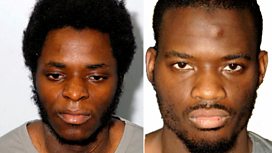Changing Jihadi Minds
Suspected extremists, even children, are now routinely referred to a secretive state programme called Channel. Journalist John Ware meets some of those who have been involved.
How do you go about trying to change a person's fundamental beliefs? And how do you decide who is in need of state intervention to do so?
Public sector workers now have a legal obligation to refer suspected Islamist and far right extremists to a local body known as a Channel panel. Referees deemed to hold extremist views are offered ideological mentoring, usually on a voluntary basis.
The government says its Channel deradicalisation programme is a success, helping prevent vulnerable people from being drawn into terrorism. But some British Muslims see it as a Big Brotherish state spying operation, wreathed in secrecy and suspicion. John Ware enters the "pre-criminal space" to find out - from the inside - how Channel works.
Producer: Simon Maybin
Researcher: Kirsteen Knight.
Last on
More episodes
Previous
![]()
Should Extremism Be a Crime?
Examining government plans to tackle the activities of non-violent extremists.
![]()
Jihadi Converts
Converts to Islam tell reporter Zubeida Malik how they were lured into extremism.
![]()
Peter Oborne's Chilcot Report
Peter Oborne gives his verdict on crucial questions raised by the 2003 invasion of Iraq.
Broadcast
- Thu 3 Dec 2015 20:00ÃÛÑ¿´«Ã½ Radio 4
Featured in...
![]()
The Best of The Report: Faith and Religion—The Report, Women Bishops
The Report investigates issues affecting religious institutions and faith organisations.
![]()
The Best of The Report: Terrorism & Extremism
Investigating all forms of extremism, from the EDL to homegrown jihadis to al-Shabaab.
Download this programme
Subscribe to this programme or download individual episodes.
The Best of The Report
Listen again to the best investigations from The Report team






